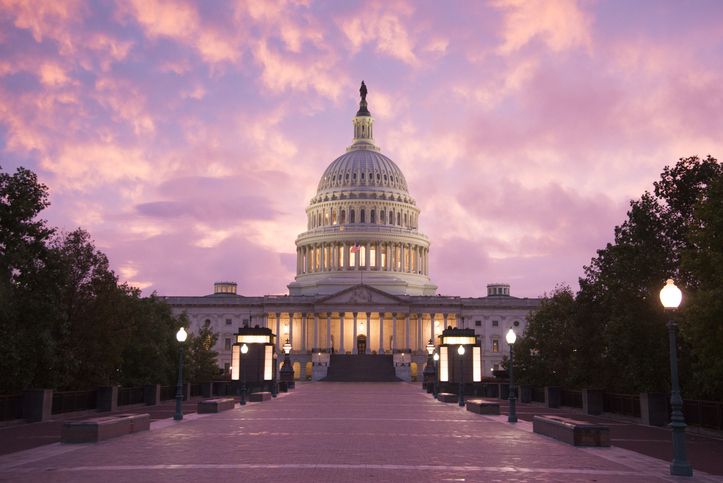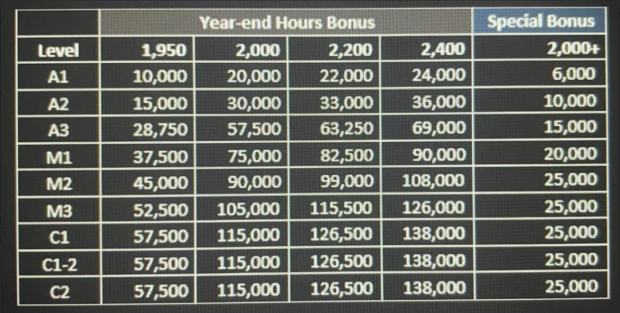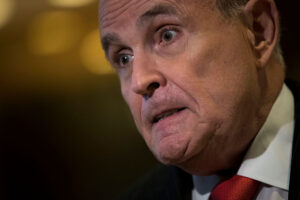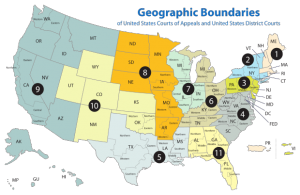(Photo
by
Drew
Angerer/Getty
Images)
Rudy
Giuliani’s
litigation
strategy
is…
unique.
It’s
kind
of
like
National
Geographic,
but
if
the
wildebeest
ran
directly
into
the
mouth
of
the
lion
every
time.
This
is
a
guy
whose
utter
refusal
to
do
paperwork
earned
him
a
$148
million
default
judgment
in
the
defamation
case
filed
by
Ruby
Freeman
and
Shaye
Moss,
the
Atlanta
poll
workers
he
falsely
accused
of
tabulating
fraudulent
ballots
in
2020.
Then
he
stumbled
into
and
out
of
bankruptcy
after
discovering
that
you
actually
do
have
turn
over
your
financial
information
if
you
want
the
protection
of
the
court.
Who
knew!
And
in
DC,
he’s
currenlty
daring
Judge
Beryl
Howell
to
hold
him
in
contempt
because
he
refuses
to
keep
Freeman
and
Moss’s
names
out
of
his
mouth.
But
the
real
action
this
week
is
in
New
York,
where
Rudy
is
facing
yet
another
potential
contempt
finding
in
the
collection
action,
as
well
as
possible
death
penalty
sanctions
for
(say
it
with
us)
failing
to
cooperate
with
discovery
and
hand
in
his
homework.
That
case
involves
Rudy’s
desperate
effort
to
hang
onto
his
Florida
condo
under
the
state’s
generous
homestead
exception,
despite
the
fact
that
he
did
his
daily
podcast
from
New
York
during
most
of
the
year
in
question.
Notably
his
prior
counsel
noped
out
rather
than
do
whatever
it
was
Rudy
was
asking
them
do
in
that
case.
Yesterday,
Judge
Lewis
Liman
signed
an order
to
show
cause
why
Rudy
should
not
be
held
in
contempt
in
the
collection
action,
instructing
him
to
file
a
response
by
Christmas
Eve
and
show
up
in
person
on
January
3
to
explain
himself.
The
court
granted
Freeman
and
Moss’s
motion,
detailing
his
total
failure
to
turn
over
his
property,
after
being
warned
that
something
very
bad
would
happen
if
he
didn’t.
Consider
this
amazing
exchange
from
a
status
conference
on
November
7
where
Rudy’s
prior
counsel
admitted
that
his
client
had
made
no
efforts
to
comply
with
an
October
22
turnover
order:
THE
COURT:
Isn’t
the
right
approach
to
that,
I’ve
ordered
your
client
to
turn
over
all
of
this
property,
and
your
client
consented
to,
said
he
had
possession
of
all
of
this
property
at
the
time
that
I
entered
the
order.
Procedurally,
he
doesn’t
have
a
choice
but
to
comply.
If
it
becomes
impossible
for
him
to
comply,
then
the
plaintiff
moves
for
contempt,
your
client
gets
on
the
stand,
and
he
goes
through
all
of
the
efforts
that
he
made
to
get
it
and
why
he
was
frustrated.
It
strikes
me
as
kind
of
hard
to
believe
that
your
client
would
not
be
able
to
get
somebody
at
the
storage
facility
to
open
up
the
storage
facility
to
get
his
property.
It’s
not
clear
to
me
what
efforts
he’s
made.
MR.
CARUSO:
I’ll
tell
you
what
efforts
we’ve
made.
THE
COURT:
No.
What
efforts
he
made.
MR.
CARUSO:
He
didn’t
make
any
efforts
other
than
what
I
made.
THE
COURT:
Okay.
That’s
kind
of
—
you
might
consider
your
words,
because
it
does
play
into
what
will
happen
if
there
were
a
contempt
proceeding
against
him.
On
November
22,
the
judge
issued
another
order
in
which
he
instructed
Giuliani
to
hand
over
his
stuff
by
December
15
“on
pain
of
contempt.”
Since
then,
Giuliani’s
efforts
have
been
uneven
at
best.
He
surrendered
the
Mercedes
he
claims
once
belonged
to
actress
Lauren
Bacall,
but
not
the
title.
He
vacated
his
apartment,
but
failed
to
give
the
plaintiffs
the
keys
or
the
deed,
and
seems
not
to
have
bothered
trying
to
take
his
ex-wife’s
name
off
the
place.
In
response
to
instructions
to
hand
over
specific
items
of
sports
memorabilia,
he
vaguely
gestured
in
the
direction
of
the
“America
First
Warehouse”
in
Ronkonkoma,
New
York,
where
his
personal
items
are
packed
away
in
opaquely
labeled
boxes.
Rudy’s
new
counsel
is
a
flamboyant
divorce
lawyer
name
Joseph
Cammarata.
His
first
move
was
to
hold
a
press
conference
outside
the
offices
of
the
plaintiffs’
counsel
to
decry
the
“lawfare”
against
America’s
Mayor.
Then
he
asked
the
court
to
delay
the
January
16
trial
so
that
Rudy
could
spend
that
week
in
DC
at
inauguration
parties.
Judge
Liman
responded
that
he
was
happier
to
entertain
a
motion
to
move
the
trial
up
to
the
week
of
the
10th,
if
the
defendant
was
so
inclined.
(He
was
not.)
On
December
8,
roughly
five
weeks
after
the
November
4
deadline
for
disclosures,
Giuliani
informed
the
plaintiffs
that
he
would
be
calling
five
new
witnesses
to
testify
that
he
really
did
live
in
Florida,
not
New
York.
Unsurprisingly,
the
plaintiffs
were
not
impressed,
particularly
since
one
of
those
witnesses
is
Rudy’s
girlfriend/cohost/emotional
support
weirdo
Dr.
Maria
Ryan,
who
has
been
ducking
process
and
who
was
the
subject
of
a
(since
granted)
motion
to
compel.
Judge
Liman
instructed
the
defendant
to
respond
by
Tuesday,
December
17.
“Defendant
shall
indicate
whether
he
will
arrange
for
the
five
additional
witnesses
to
receive
subpoenas
and
to
be
made
available
for
deposition
on
or
before
January
9,
2025,
including
when
and
where
the
witnesses
will
be
made
available
for
in-person
depositions,”
he
wrote.
“Defendant
shall
also
indicate
whether
he
will
arrange
for
the
responsive
documents
of
each
of
the
witnesses
to
be
produced
to
the
Plaintiffs
at
least
one
week
prior
to
deposition.”
Cammarata
did
indeed
respond…
sort
of.
But
we
will
not
be
linking
to
the
document,
which
included
the
witnesses’
personal
contact
information.
Cammarata
represented
that
he
will
not
be
calling
two
of
the
five
new
witnesses
at
trial.
But
he
produced
yet
another
new
witness,
one
Monsignor
Alan
Placa,
who
can
shed
light
on
Rudy’s
living
situation.
A
quick
Google
search
reveals
that
the
Monsignor
presided
over
Giuliani’s
first
wedding
in
1968,
as
well
as
its
subsequent
annulment.
In
2002,
he
was
placed
on
administrative
leave
due
to
sexual
abuse
allegations,
which
were
substantiated
by
grand
jury
testimony
from
multiple
men
who
accused
him
of
molesting
them
as
teenagers.
Rudy
then
hired
Placa
through
one
of
his
companies.
The
church
held
the
investigation
open
until
2009,
which
was
long
enough
that
Placa’s
official
exoneration
and
his
retirement
could
take
place
simultaneously.
Cammarata
informed
the
court
that
Placa
will
testify
at
the
January
16
trial,
as
will
Rudy’s
other
witnesses,
Maria
Ryan,
Michael
Ragusa,
and
Ryan
Medrano.
He
says
that
Ryan,
Ragusa,
Medrano,
and
Placa
are
amenable
to
being
deposed.
He
did
not
say
when
or
where
such
depositions
might
take
place,
and
made
no
representations
about
document
production.
This
would
seem
to
fall
somewhat
short
of
satisfying
the
court’s
order.
But
if
the
bet
is
that
Rudy’s
going
to
get
defaulted
anyway,
or
barred
from
presenting
any
of
this
evidence,
then
perhaps
it
won’t
matter
in
the
end.
Freeman
v.
Giuliani
[Collection
Docket,
via
Court
Listener]
Freeman
v.
Giuliani
[Homestead
Docket,
via
Court
Listener]
Liz
Dye lives
in
Baltimore
where
she
produces
the
Law
and
Chaos substack and podcast.
 Kathryn
Kathryn







 Chris
Chris










